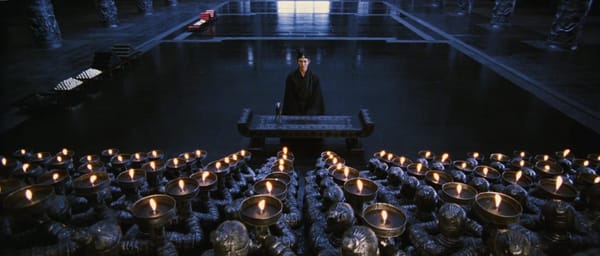A Peek Inside An Empty Shell

Video games have a unique selling point which separates them from other forms of art. They allow the consumer to actively participate in the storytelling process. This accounts for a large part of the reason why they are so popular. Not only can you affect the story, you can actually become a character within the story. This allows video games to offer the ultimate form of escapism. One way in which they might do this is to provide the player with the means to carry out a power fantasy.
One of my favourite video games of all time is Skyrim. It was the first triple-a title I played, and it set the standard for all the games I played afterwards. Skyrim excels at delivering on the promise of a power fantasy. You play as the reincarnation of the God of Time, with the ability to send people hurtling through the air by merely shouting at them. You can become the leader of every faction in the land. You can decide the fate of the civil war. You can learn every spell, acquire every unique piece of armour and weaponry, buy a house in every Hold. It feels amazing. For a time. I returned to Skyrim a few years ago, during lockdown, having played other games in the interim. I found it a very hollow experience. Looking at it with fresh eyes instead of the rose-tinted glasses of nostalgia allowed me to see the game for what it really was. Having already seen everything that there was to see, there was nothing left to discover. This was what enraptured me in the first place. The first time I played, I was overcome with wanderlust. Around every corner there was potential for something new and exciting. I explored every nook and cranny of every cave, castle and ruin I came across. I completed every quest. I spoke to every NPC until I exhausted their dialogue options. I consumed every morsel of content the game had to offer. And I loved it.
Then, returning to the game a few years later, I found that there was no novelty to be found in the world. It was then that Skyrim's true nature revealed itself. The entire experience is cynically designed to keep you playing for as long as possible. Every dungeon is packed with enemies and treasure chests. The game conditions you to loot every single one by providing a steady drip of rewards. It's normally tiny, a few gold pieces on each body and in each chest, but its enough to trigger a tiny dopamine hit each time. The game masterfully highjacks the reward pathways in your brain, giving you just enough that you keep going, but never enough that you feel sated. Almost every dungeon loops round on itself so that you don't have to backtrack; you can just venture onwards in search of your next fix. The little compass at the top of your screen provides you with a constant impetus to keep going, as there is almost always something nearby to be discovered. When you get there, you hear a swelling drum fill as the icon on the compass switches from an outline to solid, giving an instant sense of accomplishment. The sound design in the game is incredible. Whether it's a new objective, quest, location, skill increase, item crafted, or Word of Power, it comes with a satisfying sound effect that acts as a delightful pat on the head. The game never stops telling you that you're doing a good job. It never stops telling you that you're a very special boy. And you just sit there and lap it up. The trouble is that once you've done it all before it becomes tiresome. The game's core mechanics aren't enjoyable enough to engage with for their own sake, they are just the means by which the game feeds you its gameplay loop. Melee combat is poorly animated and simplistic, consisting of repeatedly pressing the same button over and over. There is little to no point in thinking about where you position yourself relative to the enemy, or where on the body you hit them. If you start running low on health you can just enter your inventory, which pauses the gameplay, making you invulnerable while you scoff down forty-six cabbages. Using magic is even worse, where you just hold down the same button until either the enemy dies or you run out of magicka. Archery is the only enjoyable form of combat, forcing you to consider how long you draw your bow for, as well as the effect of gravity on the arrow. Given that a large portion of the time in game is spent in combat, you would hope that the designers would have dedicated a bit more time and effort to making it fun. The same applies to most other aspects of gameplay: traversal is dull, and enchanting, crafting, and speaking consist entirely of selecting options from a menu. Alchemy involves a little bit of experimentation, but that's about it. Once the thrill of exploration has waned, there simply isn't that much fun to be had roaming around the world.
All of this might be excused if the writing was top-tier, but sadly this is not the case. The main quest starts with you as a prisoner on their way to be executed. Just before you are killed, a dragon appears and starts wreaking havoc. This is the first time a dragon has been sighted in Skyrim in centuries. As far as hooks go, it's pretty compelling. Once you make it through the tutorial, the world opens up to you. You can either follow whoever you escaped with, progressing the main story, or do literally anything else. If you do follow the main quest, you will be directed to Whiterun, to inform the Jarl of the dragon attack. Along the way, the game introduces you to exploration and factions, and it does so in a subtle way that feels very natural. So far so good. The first head-scratcher of a moment comes soon after, however. When you get to Whiterun, you can just stroll right up to the Jarl's palace, head in at your own leisure, and interrupt the Jarl's conversation without so much as a cursory glance from a guard. If we are to believe that this is a person of great importance, in charge of governing the largest of the province's nine Holds, how is it that you can simply walk up to them and start talking? It strains credulity that some ragged vagrant can just wander in to the Jarl's palace, let alone that he would then have time to speak to them. But logic doesn't apply, because you're special. This is a recurring theme in all the questlines in the game. At every opportunity, the game casts aside believability in favour of massaging the player's ego. It only gets worse from here. The Jarl sends you to his court wizard, who tasks you with retrieving an object of great importance from a dangerous ruin. Instead of giving this crucial job to a trusted, seasoned member of the Jarl's entourage, he gives it to the player character, who at this point likely has little more than an iron sword some flimsy armour. Once you have retrieved the tablet, a dragon attacks and you fight it alongside some guards. When it dies, it melts into ribbons of light which then shoot into the body of the protagonist. The guards start gaping at you, declaring you "Dragonborn". This is the fourth quest in the main story, and already you are being heralded as a godlike figure. From this point, the main story continues on for several hours with an unrelenting sense of narrative urgency. This is understandable, given the apocalyptic nature of the story, but it is still frustrating. It is a story about overcoming a world-ending threat, but if you just make a b-line through the main story you can defeat the so-called World Eater before being strong enough to take on a woolly mammoth. Instead of this, the game could have opened up at certain points, encouraging the player to go off and develop their skills or acquire better gear. This way, the whole story could have served as preparation for one climactic showdown, rather than a series of linear fetch quests culminating in an underwhelming finale.
Every questline suffers similarly from an insistence on putting the player front-and-centre. The leaders of The Companions bring you into the inner circle after but one major mission, and make you leader a short few quests later. Less than halfway through the Dark Brotherhood questline, you are chosen by the Night Mother to be her Listener, despite having only carried out a handful of assassinations. The Thieves Guild lets you in even if you completely screw up the entry test, and then names you leader at the end on the grounds that nobody else can be bothered. The worst offender, however, is the College of Winterhold. They name you Archmage at the end of the questline regardless of your magical ability at that time. Aside from two instances where you are forced to use magic, it's possible to go through the entire questline without using spells. This means that you can technically be named leader of the College with the same level in magic-related skills that you started the game with. All of this might seem like needless nit-picking, but it highlights a major issue in the game. When the game hands you titles and rewards for the most minimal effort, it doesn't feel earned. Furthermore, if the narratives and worldbuilding in a game don't stand up to scrutiny, they lessen the believability of the world. The world of Skyrim could never exist. I don't mean that in the sense that the magic and gods and whatnot aren't present in real life. I mean that it is just a vessel for the player. Everything within is designed around the player. Take away the player and the world falls apart. The world should exist regardless of the player; the player should be just another character making their way through it. Instead, the world is just a playground made to make them feel special. This results in them seeing the game for what it is: a game. With the immersion broken, all the cracks in the foundation start showing, and the closer you look, the more there is to take issue with. The combat, the narratives, the worldbuilding; they all have glaring problems. If it wasn't for the art design, and the music and the sound design, it's doubtful whether the game would have seen the longevity it has. The game world is huge, true, but so much of the content within is repeated that it doesn't stay that way forever. The more you play, the less you see.
I love Skyrim. I have fond memories of getting lost in its world, seeing its breathtaking vistas, exploring its lore. But I can't help but shake this feeling that it could have been so much better. I doubt I'll ever return to Skyrim. I think I'll keep what fondness I have left for it safely tucked in the case of my rose-tinted glasses, thank you very much.



